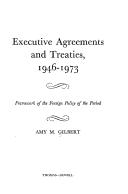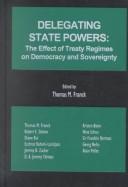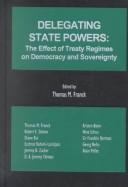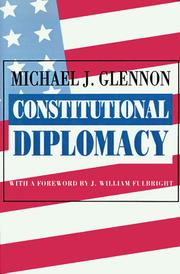| Listing 1 - 7 of 7 |
Sort by
|
Periodical
Year: 1929 Publisher: Washington, D.C. : Dept. of State : For sale by the Supt. of Docs. U.S. G.P.O.,
Abstract | Keywords | Export | Availability | Bookmark
 Loading...
Loading...Choose an application
- Reference Manager
- EndNote
- RefWorks (Direct export to RefWorks)
United States --- Foreign relations --- Executive agreements
Periodical
Year: 1929 Publisher: Washington, D.C. : Dept. of State : For sale by the Supt. of Docs. U.S. G.P.O.,
Abstract | Keywords | Export | Availability | Bookmark
 Loading...
Loading...Choose an application
- Reference Manager
- EndNote
- RefWorks (Direct export to RefWorks)
United States --- Foreign relations --- Executive agreements

ISBN: 0960069011 9780960069019 Year: 1973 Publisher: [Endicott, N.Y.] : Thomas-Newelll,
Abstract | Keywords | Export | Availability | Bookmark
 Loading...
Loading...Choose an application
- Reference Manager
- EndNote
- RefWorks (Direct export to RefWorks)
Diplomatic relations. --- United States --- Foreign relations --- Executive agreements. --- Treaties. --- 1945-1989. --- United States.
Book
Year: 1960 Publisher: The Hague : M. Nijhoff,
Abstract | Keywords | Export | Availability | Bookmark
 Loading...
Loading...Choose an application
- Reference Manager
- EndNote
- RefWorks (Direct export to RefWorks)
United States --- Etats-Unis --- Foreign relations --- Treaties. --- Executive agreements. --- Relations extérieures --- Traités

ISBN: 9789004478244 9781571051264 Year: 2000 Publisher: Leiden;Boston Brill | Nijhoff
Abstract | Keywords | Export | Availability | Bookmark
 Loading...
Loading...Choose an application
- Reference Manager
- EndNote
- RefWorks (Direct export to RefWorks)
This groundbreaking book deals with problems encountered by the United States in complying with international treaty obligations. It examines the ways in which the American constitutional system sometimes adapts to and sometimes erects barriers against the new system of global solutions to global problems and investigates the resulting challenges on a treaty-by-treaty basis with special attention to such areas as human rights and disarmament. Published under the Transnational Publishers imprint.
Democracy --- Sovereignty --- Treaty-making power --- United States --- Foreign relations --- Executive agreements.

ISBN: 1571051260 Year: 2000 Publisher: Dobbs Ferry Transnational publ.
Abstract | Keywords | Export | Availability | Bookmark
 Loading...
Loading...Choose an application
- Reference Manager
- EndNote
- RefWorks (Direct export to RefWorks)
Democracy --- Sovereignty --- Treaty-making power --- United States --- Foreign relations --- Executive agreements.

ISBN: 0691023050 9780691023052 0691078424 069122191X Year: 1991 Publisher: Princeton (N.J.): Princeton university press,
Abstract | Keywords | Export | Availability | Bookmark
 Loading...
Loading...Choose an application
- Reference Manager
- EndNote
- RefWorks (Direct export to RefWorks)
Challenging those who accept or advocate executive supremacy in American foreign-policy making, Constitutional Diplomacy proposes that we abandon the supine roles often assigned our legislative and judicial branches in that field. This book, by the former Legal Counsel to the Senate Foreign Relations Committee, is the first comprehensive analysis of foreign policy and constitutionalism to appear in over fifteen years. In the interval since the last major work on this theme was published, the War Powers Resolution has ignited a heated controversy, several major treaties have aroused passionate disagreement over the Senate's role, intelligence abuses have been revealed and remedial legislation debated, and the Iran-Contra affair has highlighted anew the extent of disagreement over first principles. Exploring the implications of these and earlier foreign policy disputes, Michael Glennon maintains that the objectives of diplomacy cannot be successfully pursued by discarding constitutional interests. Glennon probes in detail the important foreign-policy responsibilities given to Congress by the Constitution and the duty given to the courts of resolving disputes between Congress and the President concerning the power to make foreign policy. He reviews the scope of the prime tools of diplomacy, the war power and the treaty power, and examines the concept of national security. Throughout the work he considers the intricate weave of two legal systems: American constitutional principles and the international law norms that are part of the U.S. domestic legal system.
POLITICAL SCIENCE / International Relations / General. --- United States --- Foreign relations --- Law and legislation. --- Berger, Raoul. --- Bernstein exception. --- Boland Amendment. --- Bricker amendment. --- Bumpers amendment. --- Cardozo, Benjamin. --- Charles II. --- Congo rescue mission. --- Connally reservation. --- Dominican Republic. --- Eagleton, Thomas. --- General Accounting Office. --- Grenada. --- Gulf of Tonkin Resolution. --- Hamilton, Alexander. --- Heritage Foundation. --- Honduras. --- Impoundment Control Act. --- Jackson, Robert. --- Japan treaty. --- Korean Airline shoot-down. --- Laos. --- Massachusetts. --- National Security Act of 1947. --- Niagara Reservation. --- Oxford Union. --- Platt amendment. --- Restatement of Agency. --- Saigon. --- Sandalow, Terry. --- Stewart, Potter. --- actio popularis. --- adverse possession. --- assassination. --- checks and balances. --- confirmation power. --- covert operations. --- custom. --- delegation doctrine. --- dualism. --- emergency presidential powers. --- executive agreements. --- functional analysis. --- judicial review. --- kidnapping. --- legal realism. --- legislative veto. --- nuclear testing. --- passport restrictions. --- rule of recognition. --- third agency rule.
| Listing 1 - 7 of 7 |
Sort by
|

 Search
Search Feedback
Feedback About UniCat
About UniCat  Help
Help News
News